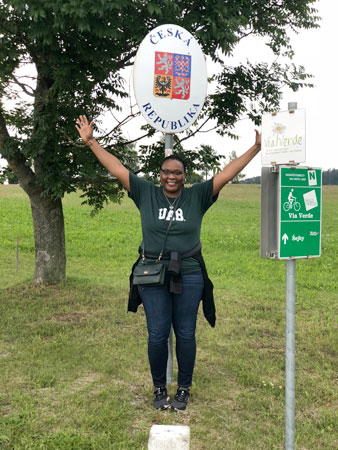 Rosianna Gray, Ph.D.An ongoing concern within the science, technology, engineering and mathematics fields is the lack of diversity within the workforce. Rosianna Gray, Ph.D., assistant professor at the University of Alabama at Birmingham, was selected as a Fulbright Specialist to discuss opportunities for STEM careers with current and potential members of the STEM community in the Czech Republic.
Rosianna Gray, Ph.D.An ongoing concern within the science, technology, engineering and mathematics fields is the lack of diversity within the workforce. Rosianna Gray, Ph.D., assistant professor at the University of Alabama at Birmingham, was selected as a Fulbright Specialist to discuss opportunities for STEM careers with current and potential members of the STEM community in the Czech Republic.
“We are addressing and raising awareness regarding the need for diversity in STEM and its benefits on society and science, not only specifically within the Czech Republic, but also around the world,” said Gray, assistant professor in the UAB College of Arts and Sciences Department of Biology. “We want to encourage current STEM professionals and students to follow their ambitions without considering any prejudices and to give the same respect to others.”
Gray will serve as a Fulbright Specialist for the Center for Systems Biology in the Czech Republic. In partnership with the center, she will visit with high school students across the region, host a regional conference and speak at various events on diversity within the STEM community.
During the first week, Gray met with professors and small groups of high school students to discuss Metacognition Strategies for Academic Achievement; Diversity in STEM; Three-in-One STEM Minority Students: Female, African-American and Low-Visibility; Developing a Love for STEM before College; Girls Engaged in Math and Science; Collaboration between Academia and the community.
During Gray’s second week, she has been a part of several small group discussions on race and ethnicity in America and the Czech Sudeten region to build a basis for cultural understanding and acceptance that extends beyond the immediate participants, laying a foundation for future visitors of diverse backgrounds and educating emissaries who can disseminate the histories and lessons that were discussed. Contemporary and historical issues within the Czech, German and United States black and white experience were discussed.
| Gray will serve as a Fulbright Specialist for the Center for Systems Biology in the Czech Republic. In partnership with the center, she will visit with high school students across the region, host a regional conference and speak at various events on diversity within the STEM community. |
“Overall, we hope to promote understanding and acceptance among people through reflection on their histories and shared experiences of past prejudice and its consequences,” Gray said. “The goal is to lay a foundation for increased tolerance now and into the future between and among the people of the Czech borderlands and visitors of diverse backgrounds from America and elsewhere.”
Gray shared her experience as a black female scientist in the Southern region of the U.S., with specifics on being raised in an area rich in the struggle for equality and civil rights history. She also discussed the importance of collaboration between academia and the community.
During the last four weeks of Gray’s tenure in the Czech Republic, she will be a speaker and project supervisor for the Annual Summer School in Molecular Biophysics and Systems Biology, which hosts high school and college student researchers. Gray will lead a research project with the students in which they will learn how to use a microscope by viewing bacterial morphology and stained bacteria of different morphologies and will compose drawings of what was seen under the microscope. She will also introduce the students to metacognition strategies that can be used not only in the classroom but in laboratory procedures as well.
The Fulbright Specialist Program through the U.S. Bureau of Educational and Cultural Affairs sends U.S. faculty and professionals to serve as expert consultants on curriculum, faculty development, institutional planning and related subjects at academic institutions abroad for two to six weeks.